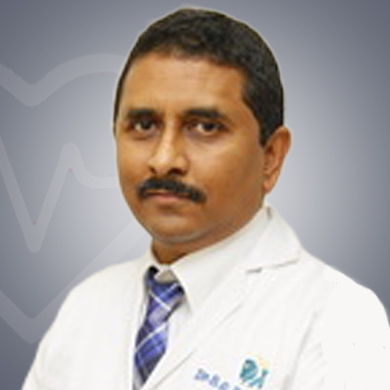
Neurosurgeon
Apollo Hospitals , Hyderabad, India24 Years of experience
Speaks: English
Dr. B G Ratnam is a highly experienced neurosurgeon with more than 20 years of clinical experience. Dr. Ratnam completed his MBBS from CMC Hospital, Vellore, in 1989. Later, he completed M.Ch. (Neurosurgery) from CMC Hospital, Vellore in the year 1997. Dr. Ratnam is currently practicing as Consultant Neurologist and Neurosurgeon at Apollo Hospital, Hyderabad. Before this, he was associated with various national and international medical centers such as CDR Hospital, Vizag, Mediciti Hospital, Hyderabad, and Flinders Med Center, Australia.
Dr. Ratnam is an expert in performing various complex neurosurgeries with high success rate. The treatment provided by Dr. Ratnam includes Petrosal Sinus Sampling, Brain Arteriovenous Fistula Embolization, Spinal, and Cerebral Tumor Embolization, and Carotid Body Tumor Embolization. Various research papers of his have been published in many national and international journals. He has also presented a paper on “Navigation in Neurosurgery” in 54th Congress of West African Surgeons. Dr. Ratnam is the Life Member of Neurological Society of Inia and Association of Spine Surgeons of India.
Neurosurgeons are trained to treat people suffering aneurysms, blocked arteries, trauma to the brain and spine, birth defects, chronic low-back pain, brain and spinal cord cancer, and peripheral nerve problems. Neurosurgeons also do surgeries for carpal tunnel syndrome, spinal surgery, and brain tumor removal surgery. Here is a list of some of the conditions Dr. B G Ratnam treats:
Neurological conditions produce different symptoms ranging from mild to severe. You should never ignore any such symptoms because these may lead to severe results if left unaddressed. Some of the signs and symptoms that neurological disorders can produce are listed below.
Neurologic symptoms are generally caused by a disorder that affects the nervous system and could vary greatly as the nervous system controls many various body functions. Symptoms can be all forms of pain and can involve muscle function, the special senses, sleep, awareness, and mental function.
The working hour of doctor B G Ratnam is 11 am to 5 pm from Monday to Saturday. The doctor has an off on Sunday. Although the doctor is mostly available during operating hours, you should check with the doctor for his availability and then visit his clinic/hospital.
Some of the popular procedures that Dr B G Ratnam perform are given below::
Dr. B G Ratnam specializes in the surgical treatment of neurological disorders and has operated on a large number of diseases. The neurosurgeon has developed an excellent team of physicians to handle even the most complex cases with minimal invasion and the highest safety. The team includes neurosurgeons and neuroradiologists who are regional experts in the surgical treatment of neurological diseases.

Share Your Experience about Dr. B G Ratnam

Neurosurgeons, also known as brain surgeons, are doctors who specialize in the surgical treatment of conditions that affect the nervous system, brain, and spine. Neurosurgeons first have the training which makes them eligible to practise as a doctor. After this, they complete specialist training in neurosurgery. Neurosurgeons are regarded as highly trained specialists who perform some of the most critical surgeries on the brain and spine. The nervous system being the most complicated part of the body needs great precision and accuracy while performing surgery. Neurosurgeons also may also consult other specialists and medical professionals as per the requirement of surgery.
A neurosurgeon will recommend you one or more diagnostic tests before and during consultation in order to find out the case of the condition and start the right treatment. A neurological exam or a neuro exam is the evaluation of an individual’s nervous system to know how well it is functioning and find out an underlying condition. A neurological exam may include:
Below are some tests that a neurosurgeon may recommend for the diagnosis of the conditions of the nervous system.:
Here are some of the common signs that you must seek the medical assistance of a neurosurgeon:
Neurosurgeons perform complicated operations on the brain. Also, they deal with the whole nervous system and treat all the body parts that are affected by nerve issues. Typically, a neurosurgeon will diagnose patients' symptoms and come up with minimally invasive treatment plans.